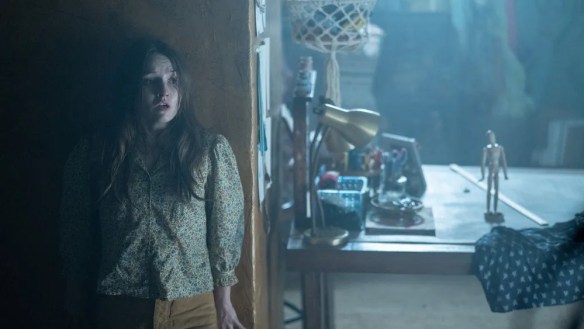Hello folks, and welcome back to Wrong Every Time. Today I am proud to announce that I’ve actually fucking done it – my last episodic Evangelion writeup is already sitting in my drafts, and I’m feeling confident it’s one of my best so far. Charging through this last act of the show in a matter of weeks turned out to be the perfect way to approach it; I could feel the same sense of desperation and longing as our poor pilots, calling back to the many times I marathoned Evangelion back in high school and college. The show is still just as poignant and insightful as it struck me back when it was permanently reshaping my brain chemistry, and I feel fortunate to have this chance at articulating just how much it means to me. Anyway, those will be popping up over the next few weeks, but for now I’ve got a fresh selection of film features for your perusal. Let’s get to it!
First up this week was No One Will Save You, a recent scifi home invasion film written and directed by Brian Duffield. Kaitlyn Dever stars as Brynn, a seamstress who lives alone in her family home, and who seems to have committed some terrible act that has made her a pariah within the local community. However, Brynn finds she has more than resentful neighbors to worry about when her home comes under assault by a series of alien invaders, forcing her to fight for a life that she’s not actually sure is worth saving.
No One Will Save You is a brilliant exercise in economy in basically every regard. Given we spend the entire film following the profoundly isolated Brynn, the script contains perhaps just a dozen words of spoken dialogue, further emphasizing the quiet loneliness of her world. We come to know the contours of her familiar house as she does, and when the invasion actually begins, the lack of dialogue allows the film’s marvelous sound design to take center stage, ensuring every creak of floorboards or rattle of a window feels ominous and consequential. Yet at the same time, this isn’t just a “bumps in the night” sort of horror film – its threats are tangible and terrible, variations on the classic alien “grays” that feel fresh simply by how seriously they are treated.
I also appreciated the similar economy of Brynn’s history; it’s easy to guess the broad beats of where the story is going, but the breadcrumb trail of past details nonetheless adds a satisfying personal compliment to the film’s supernatural specters. The finale didn’t tether these two threads together quite as gracefully as I might have hoped, but that’s a small complaint to make regarding an altogether exceptional horror film, a film that succeeded in making me feel vulnerable and – dare I say it – actually kinda scared. Excellent work, Duffield!
Our next viewing was Cobra, an ‘80s fever dream starring Sylvester Stallone as Officer Cobretti, the only cop tough enough to fight our World of Crime. Apparently the film’s genesis came from Stallone being offered the Beverly Hills Cop role, returning an updated script that basically excised all of the film’s humor, and deciding to make his script anyway when his edits were rejected. Good call on that one, producers!
Anyway, Cobra is a nasty slice of crime wave hysteria in the same model as Dirty Harry or Death Wish, and even stars a couple of the same actors as the former. Like those films, it’s a deeply fascist text that posits the only way to stop crime is to put all these crime-driven monsters six feet under, as people like that are naturally predisposed to be menaces to society. Cobra even bookends itself with little speeches articulating its values: the first from a mewling reporter whining about “due process” and other such trivialities, the last from the film’s villain, cackling that he’ll get away on an insanity defense due to all these weak-willed judges.
So yeah, utterly atrocious politics, but otherwise a pretty entertaining film! Stallone is in fine form as the quipping yet merciless Cobretti, wielding his aviators as dramatically as Eastwood wields a sombrero. There are two satisfyingly destructive chase scenes, a steady drip of shootouts, and a final foundry battle where chains, molten slag, and a big rotating hook all make commendable contributions. And this far removed from the noxious political era that inspired it, even Cobra’s philosophy feels more quaint than actively nefarious; the film’s plot involves a “crime army” who commit random murders apparently just for fun, offering an amusing glimpse into the paranoid minds of tough-on-crime conservatives. Go get ‘em, cowboys.
We then checked out Ten Tigers from Kwangtung, a Chang Cheh-directed Shaw Brothers film featuring a sprawling all-star lineup of Shaw Bros talent. The film concerns the alliance of ten legendary martial artists, who join together in order to fight the tyranny of the ruling Qing dynasty. The story of their formation is bookended by a later tale, wherein the disciples of the Ten Tigers are hunted down by vengeful assassins, who eventually find themselves facing the wrath of the Tigers themselves.
Ten Tigers from Kwangtung is hamstrung by the rare problem of simply starring more talent than it knows what to do with. With only ninety minutes to introduce the Tigers, their apprentices, and their various enemies, the film is essentially still wrapped up in introductions until its last act, leaving very little time for its cast to actually do anything. There are well-choreographed battles scattered throughout, but without any real narrative progression, the film struggles to evoke a sense of urgency or dramatic intent. I’d consider this one an easy skip if not for its final battle, a pair of simultaneous duels conducted between two spearmen and two swordsmen, which counts among the most thrilling bouts I’ve witnessed in the Shawniverse. That climax can’t really make up for seventy minutes of introducing new characters, but it certainly had me smiling through the credits.
Last up for the week was The Company of Wolves, a gothic fantasy horror film that truly lives up to all three of its subgenres. The film centers on Rosaleen, a young girl who dreams of a previous life in a forest haunted by terrible wolves. Though her sister Alice is hunted and killed by the beasts, Rosaleen herself shows little fear, bravely walking the road to her grandmother’s house and conversing freely with the heavy-browed huntsman she meets on the way. Alongside Alice’s own ill-fated adventures, we are also treated to a variety of brief in-story fables, cautionary tales told by Alice and others with gruesome details and uncertain morals.
I absolutely adored this whimsical, off-kilter, and frequently disturbing film. Its ornate, hand-crafted set design and otherworldly tone, something like a dream that seems precipitously verging on a nightmare, calls to mind ‘80s classics like Labyrinth and The Dark Crystal. However, The Company of Wolves is not a family adventure; its stories frequently escalate into scenes of panic, chaos, and grotesque body horror, with Neil Jordan’s capable direction ensuring both what is shown and what is implied are equally unsettling.
With its rambling structure and frequent digressions into ambiguous fables, The Company of Wolves deftly evades the sort of clear-cut moralizing that often accompanies and sanitizes the inherent wildness of fairy tales. Wolves are dangerous outsiders, but The Company of Wolves’ vignettes revel in the monstrousness of humans as well, and the takeaway is never something so simple as “do not talk to strangers.” The barbarity of class, the dehumanization of groupthink, and the frightful discoveries of sexual awakening are all considered alongside the self-evident need to huddle together for collective protection, resulting in a film whose moral contours are as vague and enticing as its fantastical embellishments. Absolutely recommended.




